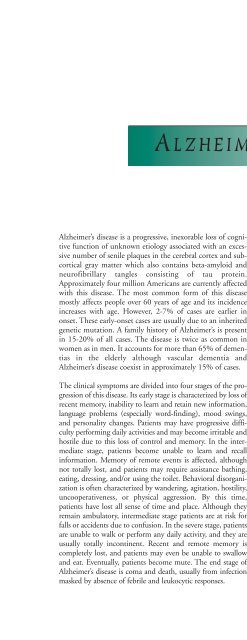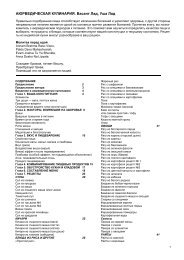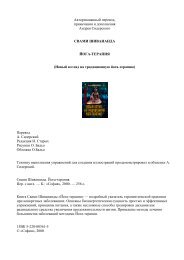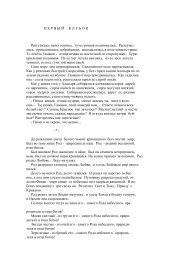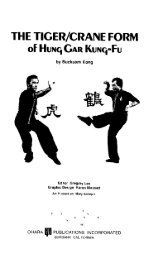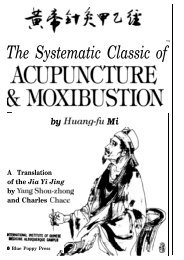- Page 4:
PRAISE FORTHE TREATMENT OF MODERN W
- Page 8:
This volume will serve not only as
- Page 12:
THE TREATMENT OFMODERN WESTERN MEDI
- Page 18:
Published by:BLUE POPPY PRESSA Divi
- Page 22:
xTHE TREATMENT OF MODERN WESTERN DI
- Page 28:
TABLE OF CONTENTS(ALPHABETICAL)Pref
- Page 32:
TABLE OF CONTENTS (ALPHABETICAL)xv5
- Page 36:
TABLE OF CONTENTS(BY MEDICAL SPECIA
- Page 40:
TABLE OF CONTENTS (BY MEDICAL SPECI
- Page 44:
INTRODUCTIONThis book is a clinical
- Page 48:
INTRODUCTION 3appearances from the
- Page 52:
INTRODUCTION 5or even international
- Page 56:
INTRODUCTION 7SAMPLECopyright © Bl
- Page 60:
INTRODUCTION 9Expel windCourse wind
- Page 64:
INTRODUCTION 11the first thing to d
- Page 68:
INTRODUCTION 13understands, the eas
- Page 72:
➤➤➤INTRODUCTION 15if qi stagn
- Page 76:
INTRODUCTION 17may damage yin fluid
- Page 80:
INTRODUCTION 19The lifegate is the
- Page 84:
INTRODUCTION 21tioned above, Qing d
- Page 88:
INTRODUCTION 23formula from the qi-
- Page 92:
INTRODUCTION 25towards yin vacuity
- Page 96: INTRODUCTION 27HEART-GALLBLADDER QI
- Page 100: INTRODUCTION 29ment and transformat
- Page 104: INTRODUCTION 31mai is connected wit
- Page 108: INTRODUCTION 33scribed].” 31 In o
- Page 112: INTRODUCTION 35and acute diseases a
- Page 116: INTRODUCTION 37Similarly, the durat
- Page 120: 1ACNE VULGARISAcne vulgaris or comm
- Page 124: ACNE VULGARIS 41Scutellariae ), Chi
- Page 128: ACNE VULGARIS 43Dang Shen (Radix Co
- Page 132: ACNE VULGARIS 45(Fructus Forsythiae
- Page 136: 2ALLERGIC RHINITISAllergic rhinitis
- Page 140: ALLERGIC RHINITIS 49Chang Pu (Rhizo
- Page 144: ALLERGIC RHINITIS 51ANALYSIS OF FOR
- Page 152: ALZHEIMER’S DISEASE 55Bai Shao (R
- Page 156: ALZHEIMER’S DISEASE 57Tian Ma (Rh
- Page 160: 4AMYOTROPHIC LATERALSCLEROSISAmytro
- Page 164: AMYOTROPHIC LATERAL SCLEROSIS (ALS)
- Page 168: AMYOTROPHIC LATERAL SCLEROSIS (ALS)
- Page 172: AMYOTROPHIC LATERAL SCLEROSIS (ALS)
- Page 178: 68 THE TREATMENT OF MODERN WESTERN
- Page 182: 70 THE TREATMENT OF MODERN WESTERN
- Page 188: 6APLASTIC ANEMIAAplastic or hypopla
- Page 192: APLASTIC ANEMIA (AA) 75Zha (Fructus
- Page 196:
APLASTIC ANEMIA (AA) 77ANALYSIS OF
- Page 200:
7BEHÇET’S SYNDROMEBehçet’s sy
- Page 204:
BEHÇET’S SYNDROME 81Cao clear th
- Page 208:
BEHÇET’S SYNDROME 83Picrorrhizae
- Page 212:
BEHÇET’S SYNDROME 85in the stool
- Page 218:
88 THE TREATMENT OF MODERN WESTERN
- Page 222:
90 THE TREATMENT OF MODERN WESTERN
- Page 226:
92 THE TREATMENT OF MODERN WESTERN
- Page 230:
94 THE TREATMENT OF MODERN WESTERN
- Page 234:
96 THE TREATMENT OF MODERN WESTERN
- Page 238:
98 THE TREATMENT OF MODERN WESTERN
- Page 242:
100 THE TREATMENT OF MODERN WESTERN
- Page 246:
102 THE TREATMENT OF MODERN WESTERN
- Page 250:
104 THE TREATMENT OF MODERN WESTERN
- Page 254:
106 THE TREATMENT OF MODERN WESTERN
- Page 258:
108 THE TREATMENT OF MODERN WESTERN
- Page 262:
110 THE TREATMENT OF MODERN WESTERN
- Page 266:
112 THE TREATMENT OF MODERN WESTERN
- Page 272:
12CEREBRAL VASCULAR DISEASECerebral
- Page 276:
CEREBRAL VASCULAR DISEASE 117ACUPUN
- Page 280:
CEREBRAL VASCULAR DISEASE 119Chines
- Page 286:
122 THE TREATMENT OF MODERN WESTERN
- Page 290:
124 THE TREATMENT OF MODERN WESTERN
- Page 294:
126 THE TREATMENT OF MODERN WESTERN
- Page 300:
14CHOLECYSTITIS/CHOLELITHIASISChole
- Page 304:
CHOLECYSTITIS/CHOLELITHIASIS 131(Ge
- Page 308:
CHOLECYSTITIS/CHOLELITHIASIS 133ING
- Page 312:
CHOLECYSTITIS/CHOLELITHIASIS 1356.
- Page 318:
138 THE TREATMENT OF MODERN WESTERN
- Page 322:
140 THE TREATMENT OF MODERN WESTERN
- Page 326:
142 THE TREATMENT OF MODERN WESTERN
- Page 330:
144 THE TREATMENT OF MODERN WESTERN
- Page 334:
146 THE TREATMENT OF MODERN WESTERN
- Page 338:
148 THE TREATMENT OF MODERN WESTERN
- Page 342:
150 THE TREATMENT OF MODERN WESTERN
- Page 346:
152 THE TREATMENT OF MODERN WESTERN
- Page 350:
154 THE TREATMENT OF MODERN WESTERN
- Page 354:
156 THE TREATMENT OF MODERN WESTERN
- Page 358:
158 THE TREATMENT OF MODERN WESTERN
- Page 362:
160 THE TREATMENT OF MODERN WESTERN
- Page 366:
162 THE TREATMENT OF MODERN WESTERN
- Page 370:
164 THE TREATMENT OF MODERN WESTERN
- Page 374:
166 THE TREATMENT OF MODERN WESTERN
- Page 378:
168 THE TREATMENT OF MODERN WESTERN
- Page 382:
170 THE TREATMENT OF MODERN WESTERN
- Page 386:
172 THE TREATMENT OF MODERN WESTERN
- Page 390:
174 THE TREATMENT OF MODERN WESTERN
- Page 394:
176 THE TREATMENT OF MODERN WESTERN
- Page 398:
178 THE TREATMENT OF MODERN WESTERN
- Page 402:
180 THE TREATMENT OF MODERN WESTERN
- Page 406:
182 THE TREATMENT OF MODERN WESTERN
- Page 410:
184 THE TREATMENT OF MODERN WESTERN
- Page 414:
186 THE TREATMENT OF MODERN WESTERN
- Page 418:
188 THE TREATMENT OF MODERN WESTERN
- Page 422:
190 THE TREATMENT OF MODERN WESTERN
- Page 428:
22CORONARY ARTERY DISEASE(CAD)Coron
- Page 432:
CORONARY ARTERY DISEASE (CAD) 195ib
- Page 436:
CORONARY ARTERY DISEASE (CAD) 197mu
- Page 440:
CORONARY ARTERY DISEASE (CAD) 199Zh
- Page 444:
CORONARY ARTERY DISEASE (CAD) 201th
- Page 448:
CORONARY ARTERY DISEASE (CAD) 203ev
- Page 454:
206 THE TREATMENT OF MODERN WESTERN
- Page 460:
24CROHN’S DISEASEAlso called gran
- Page 464:
CROHN’S DISEASE 211Yi Yi Ren (Sem
- Page 470:
214 THE TREATMENT OF MODERN WESTERN
- Page 474:
216 THE TREATMENT OF MODERN WESTERN
- Page 478:
218 THE TREATMENT OF MODERN WESTERN
- Page 482:
220 THE TREATMENT OF MODERN WESTERN
- Page 486:
222 THE TREATMENT OF MODERN WESTERN
- Page 492:
27DIABETES MELLITUSDiabetes mellitu
- Page 496:
DIABETES MELLITUS (DM) 227qi stagna
- Page 500:
DIABETES MELLITUS (DM) 229(Fructus
- Page 504:
DIABETES MELLITUS (DM) 231Zhu, Bai
- Page 508:
28DIVERTICULITISDiverticula are sma
- Page 512:
DIVERTICULITIS 235Lian Zi (Fructus
- Page 516:
29FANCONI’S SYNDROMEFanconi’s s
- Page 520:
FALCONI’S SYNDROME 239ACUPUNCTURE
- Page 526:
242 THE TREATMENT OF MODERN WESTERN
- Page 530:
244 THE TREATMENT OF MODERN WESTERN
- Page 534:
246 THE TREATMENT OF MODERN WESTERN
- Page 538:
248 THE TREATMENT OF MODERN WESTERN
- Page 542:
250 THE TREATMENT OF MODERN WESTERN
- Page 548:
31GOUTFormerly known as “the dise
- Page 552:
GOUT 255ACUPUNCTURE & MOXIBUSTION:
- Page 556:
GOUT 257inals are better for the el
- Page 560:
GOUT 2595. In most cases of gout, s
- Page 566:
262 THE TREATMENT OF MODERN WESTERN
- Page 570:
264 THE TREATMENT OF MODERN WESTERN
- Page 576:
33HEMORRHOIDSHemorrhoids, also call
- Page 580:
HEMORRHOIDS 269Ze Xie (Rhizoma Alis
- Page 584:
HEMORRHOIDS 271depression, spleen v
- Page 590:
274 THE TREATMENT OF MODERN WESTERN
- Page 594:
276 THE TREATMENT OF MODERN WESTERN
- Page 598:
278 THE TREATMENT OF MODERN WESTERN
- Page 602:
280 THE TREATMENT OF MODERN WESTERN
- Page 606:
282 THE TREATMENT OF MODERN WESTERN
- Page 610:
284 THE TREATMENT OF MODERN WESTERN
- Page 614:
286 THE TREATMENT OF MODERN WESTERN
- Page 618:
288 THE TREATMENT OF MODERN WESTERN
- Page 622:
290 THE TREATMENT OF MODERN WESTERN
- Page 626:
292 THE TREATMENT OF MODERN WESTERN
- Page 630:
294 THE TREATMENT OF MODERN WESTERN
- Page 634:
296 THE TREATMENT OF MODERN WESTERN
- Page 638:
298 THE TREATMENT OF MODERN WESTERN
- Page 642:
300 THE TREATMENT OF MODERN WESTERN
- Page 646:
302 THE TREATMENT OF MODERN WESTERN
- Page 650:
304 THE TREATMENT OF MODERN WESTERN
- Page 654:
306 THE TREATMENT OF MODERN WESTERN
- Page 658:
308 THE TREATMENT OF MODERN WESTERN
- Page 662:
310 THE TREATMENT OF MODERN WESTERN
- Page 668:
40HYPOTENSIONHypotension refers to
- Page 672:
HYPOTENSION 315San Li fortifies the
- Page 676:
HYPOTENSION 3172. Because low blood
- Page 682:
320 THE TREATMENT OF MODERN WESTERN
- Page 686:
322 THE TREATMENT OF MODERN WESTERN
- Page 690:
324 THE TREATMENT OF MODERN WESTERN
- Page 694:
326 THE TREATMENT OF MODERN WESTERN
- Page 698:
328 THE TREATMENT OF MODERN WESTERN
- Page 702:
330 THE TREATMENT OF MODERN WESTERN
- Page 708:
43IRRITABLE BOWEL SYNDROMEIrritable
- Page 712:
IRRITABLE BOWEL SYNDROME (IBS) 335f
- Page 716:
44LATERAL EPICONDYLITISLateral epic
- Page 720:
LATERAL EPICONDYLITIS 339ing profes
- Page 726:
342 THE TREATMENT OF MODERN WESTERN
- Page 730:
344 THE TREATMENT OF MODERN WESTERN
- Page 734:
346 THE TREATMENT OF MODERN WESTERN
- Page 740:
46LYME DISEASELyme disease is a tic
- Page 744:
LYME DISEASE 351ANALYSIS OF FORMULA
- Page 748:
47MACULAR DEGENERATIONAlso called s
- Page 752:
MACULAR DEGENERATION 355(Radix Salv
- Page 756:
MACULAR DEGENERATION 357more succes
- Page 762:
360 THE TREATMENT OF MODERN WESTERN
- Page 766:
362 THE TREATMENT OF MODERN WESTERN
- Page 770:
364 THE TREATMENT OF MODERN WESTERN
- Page 774:
366 THE TREATMENT OF MODERN WESTERN
- Page 778:
368 THE TREATMENT OF MODERN WESTERN
- Page 782:
370 THE TREATMENT OF MODERN WESTERN
- Page 786:
372 THE TREATMENT OF MODERN WESTERN
- Page 790:
374 THE TREATMENT OF MODERN WESTERN
- Page 794:
376 THE TREATMENT OF MODERN WESTERN
- Page 798:
378 THE TREATMENT OF MODERN WESTERN
- Page 804:
51MYASTHENIA GRAVISMyasthenia gravi
- Page 808:
MYASTHENIA GRAVIS 383the sinew vess
- Page 812:
MYASTHENIA GRAVIS 3855. BLOOD STASI
- Page 816:
52ORAL LEUKOPLAKIAOral leukoplakia
- Page 820:
ORAL LEUKOPLAKIA 389ACUPUNCTURE & M
- Page 824:
53OSTEOARTHRITISAlso called degener
- Page 828:
OSTEOARTHRITIS (OA) 393ANALYSIS OF
- Page 832:
OSTEOARTHRITIS (OA) 395INGREDIENTS:
- Page 836:
OSTEOARTHRITIS (OA) 397ADDITIONS &
- Page 840:
OSTEOARTHRITIS (OA) 399Feng (Radix
- Page 846:
402 THE TREATMENT OF MODERN WESTERN
- Page 850:
404 THE TREATMENT OF MODERN WESTERN
- Page 856:
55PARKINSON’S DISEASEParkinson’
- Page 860:
PARKINSON’S DISEASE (PD) 409Hui (
- Page 864:
PARKINSON’S DISEASE (PD) 411Ming
- Page 868:
56PEPTIC ULCERSPeptic ulcers are a
- Page 872:
PEPTIC ULCERS 415also very common t
- Page 876:
PEPTIC ULCERS 4174. CONSTRUCTIVE &
- Page 880:
PEPTIC ULCERS 419RX: Dan Shen Yin (
- Page 884:
57PERIARTHRITISOF THE SHOULDERAlso
- Page 888:
PERIARTHRITIS OF THE SHOULDER 423Ov
- Page 892:
PERIARTHRITIS OF THE SHOULDER 425TR
- Page 896:
PERIARTHRITIS OF THE SHOULDER 427Xu
- Page 902:
430 THE TREATMENT OF MODERN WESTERN
- Page 906:
432 THE TREATMENT OF MODERN WESTERN
- Page 910:
434 THE TREATMENT OF MODERN WESTERN
- Page 914:
436 THE TREATMENT OF MODERN WESTERN
- Page 918:
438 THE TREATMENT OF MODERN WESTERN
- Page 924:
60PIRIFORMIS SYNDROMEPiriformis syn
- Page 928:
PIRIFORMIS SYNDROME 443ACUPUNCTURE
- Page 932:
61PNEUMONIAPneumonia or pneumonitis
- Page 936:
PNEUMONIA 4473. PHLEGM HEAT CONGEST
- Page 940:
62POLYMYOSITIS/DERMATOMYOSITISPolym
- Page 944:
POLYMYOSITIS/DERMATOMYOSITIS 451Hua
- Page 948:
POLYMYOSITIS/DERMATOMYOSITIS 453Fu
- Page 952:
POLYMYOSITIS/DERMATOMYOSITIS 455TRE
- Page 958:
458 THE TREATMENT OF MODERN WESTERN
- Page 962:
460 THE TREATMENT OF MODERN WESTERN
- Page 966:
462 THE TREATMENT OF MODERN WESTERN
- Page 970:
464 THE TREATMENT OF MODERN WESTERN
- Page 976:
65PULMONARY TUBERCULOSISTuberculosi
- Page 980:
PULMONARY TUBERCULOSIS 469NOTE: The
- Page 984:
PULMONARY TUBERCULOSIS 471RX: Pao Z
- Page 988:
66RAYNAUD’S PHENOMENON& DISEASERa
- Page 992:
RAYNAUD’S PHENOMENON & DISEASE 47
- Page 996:
RAYNAUD’S PHENOMENON & DISEASE 47
- Page 1000:
67REFLUX ESOPHAGITISReflux esophagi
- Page 1004:
REFLUX ESOPHAGITIS 481Xiang Fu (Rhi
- Page 1008:
REFLUX ESOPHAGITIS 483REMARKS1. Liv
- Page 1014:
486 THE TREATMENT OF MODERN WESTERN
- Page 1018:
488 THE TREATMENT OF MODERN WESTERN
- Page 1022:
490 THE TREATMENT OF MODERN WESTERN
- Page 1026:
492 THE TREATMENT OF MODERN WESTERN
- Page 1030:
494 THE TREATMENT OF MODERN WESTERN
- Page 1034:
496 THE TREATMENT OF MODERN WESTERN
- Page 1038:
498 THE TREATMENT OF MODERN WESTERN
- Page 1042:
500 THE TREATMENT OF MODERN WESTERN
- Page 1046:
502 THE TREATMENT OF MODERN WESTERN
- Page 1050:
504 THE TREATMENT OF MODERN WESTERN
- Page 1054:
506 THE TREATMENT OF MODERN WESTERN
- Page 1060:
73STRESS INCONTINENCEStress inconti
- Page 1064:
74SUBARACHNOID HEMORRHAGE(SAH)Subar
- Page 1068:
SUBARACHNOID HEMORRHAGE 513point an
- Page 1072:
SUBARACHNOID HEMORRHAGE 5156. Predn
- Page 1078:
518 THE TREATMENT OF MODERN WESTERN
- Page 1082:
520 THE TREATMENT OF MODERN WESTERN
- Page 1086:
522 THE TREATMENT OF MODERN WESTERN
- Page 1090:
524 THE TREATMENT OF MODERN WESTERN
- Page 1094:
526 THE TREATMENT OF MODERN WESTERN
- Page 1100:
76TEMPOROMANDIBULAR JOINTSYNDROMETe
- Page 1104:
TEMPOROMANDIBULAR JOINT SYNDROME (T
- Page 1108:
TEMPOROMANDIBULAR JOINT SYNDROME (T
- Page 1112:
TEMPOROMANDIBULAR JOINT SYNDROME (T
- Page 1116:
TEMPOROMANDIBULAR JOINT SYNDROME (T
- Page 1122:
540 THE TREATMENT OF MODERN WESTERN
- Page 1126:
542 THE TREATMENT OF MODERN WESTERN
- Page 1130:
544 THE TREATMENT OF MODERN WESTERN
- Page 1134:
546 THE TREATMENT OF MODERN WESTERN
- Page 1138:
548 THE TREATMENT OF MODERN WESTERN
- Page 1142:
550 THE TREATMENT OF MODERN WESTERN
- Page 1146:
552 THE TREATMENT OF MODERN WESTERN
- Page 1150:
554 THE TREATMENT OF MODERN WESTERN
- Page 1154:
556 THE TREATMENT OF MODERN WESTERN
- Page 1158:
558 THE TREATMENT OF MODERN WESTERN
- Page 1162:
560 THE TREATMENT OF MODERN WESTERN
- Page 1168:
BIBLIOGRAPHYCHINESE LANGUAGE BIBLIO
- Page 1172:
CHINESE LANGUAGE BIBLIOGRAPHY 565Ne
- Page 1176:
CHINESE LANGUAGE BIBLIOGRAPHY 567
- Page 1180:
ENGLISH LANGUAGE BIBLIOGRAPHY 569Zh
- Page 1184:
ENGLISH LANGUAGE BIBLIOGRAPHY 571En
- Page 1188:
FRENCH LANGUAGE BIBLIOGRAPHY 573FRE
- Page 1194:
576 THE TREATMENT OF MODERN WESTERN
- Page 1198:
578 THE TREATMENT OF MODERN WESTERN
- Page 1202:
580 THE TREATMENT OF MODERN WESTERN
- Page 1206:
582 THE TREATMENT OF MODERN WESTERN
- Page 1210:
584 THE TREATMENT OF MODERN WESTERN
- Page 1214:
586 THE TREATMENT OF MODERN WESTERN
- Page 1218:
588 THE TREATMENT OF MODERN WESTERN
- Page 1222:
590 THE TREATMENT OF MODERN WESTERN
- Page 1226:
592 THE TREATMENT OF MODERN WESTERN
- Page 1230:
594 THE TREATMENT OF MODERN WESTERN
- Page 1234:
596 THE TREATMENT OF MODERN WESTERN
- Page 1238:
CURING DEPRESSION NATURALLY WITHCHI
- Page 1242:
THE SYSTEMATIC CLASSIC OFACUPUNCTUR


